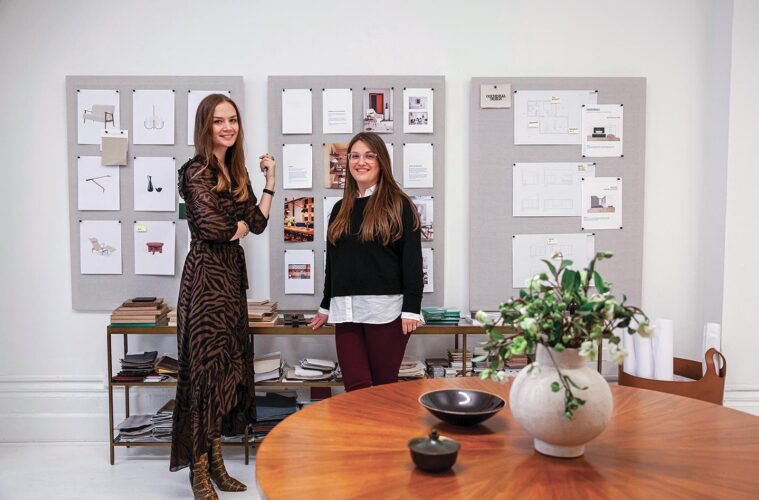For Sarah Mendel ’09, a stunning space needs a timeless sensibility, subtle finishes, and just a touch of pizzazz.
Sarah Mendel ’09 doesn’t own the typical white, 40-piece set of tableware.
A proponent of moritsuke, the traditional Japanese style of food presentation, no two dishes in her kitchen are alike. Instead, when planning a meal, she puts emphasis on whether the plate she chooses will accentuate the food she’ll place on it. She brings that general philosophy — that a design should enhance a space’s original features — to her work as co-founder of Cochineal Design.
The business, founded in 2015, has thrived through word of mouth (and its recent feature in Elle Decor), Mendel says. Every space she and her partner, Risa Emen, touch exhibits minimal design mixed with showstopping pieces. Together they facilitate every part of the design process, from interviewing a new client to determine lifestyle needs to developing a floor plan with inspo images. At the end of a project, Mendel is most excited to see the details: “Because we are capable, as designers, of visualizing what we’re designing, we don’t have the big ‘A-ha!’ reveal moment,” she explains. “It’s the things that aren’t exciting to other people, like, ‘That joint looks perfect!’”
Mendel’s path to design was winding — she studied international relations at Colgate, spending two summers interning for the real estate development firm Iron State Development. Much of the internship involved job shadowing, and when she sat in on meetings, she was always drawn to the architects, engineers, and designers in the room, inspired by the creative side of real estate development. “I was trying to get into any meeting with them,” she remembers. After graduation, she took a job with the experience design firm ICRAVE before moving back into the development space while attending Parsons School of Design full time. From there, after a stop at Virginia Tupker Interiors, she branched out to create Cochineal Design. “It feels really circular to go development-design-development-design, but I think ultimately, they both reinforced each other and got me to where I wanted to be.”
The firm has taken Mendel’s team from its home base of Midtown Manhattan to Timber Cove Resort, a restored 1960s hotel on the Sonoma coastline, and back again, designing residential and commercial properties all over New York City. Intentionally lacking a particular design aesthetic, Cochineal prefers to honor the client’s likes and dislikes. “If a client’s reaching out to us, they obviously like what we’ve done in the past, [but] we need to be respectful of something they’re interested in,” Mendel explains. “We never try to just replicate. Every project is project-specific.”
Though each space is different, Mendel and co. have three design tenets that keep the firm’s work consistent:
Tenet 1: Think in Context
Whether the space is specifically indoor, or if it has an outdoor element, almost all of Cochineal’s projects are context driven. “[That’s] in terms of the existing architecture, but also where you are in the world. If you’re in Brooklyn, overlooking McCarren Park, then you have a whole green space that many New Yorkers don’t have, so we like to think of that [when designing the home].” Indoors, it could mean showcasing the millwork of a 19th-century home to reinforce the house’s historic look and feel.
Tenet 2: Watch Your Tone
For Cochineal, tone isn’t always focused on color. When designing a space, the firm divides the project into low, mid, and high tones, including an element from each of those. For example, the mid tone is usually a natural material, like wood, metal, or leather. “We don’t work with a lot of materials that have been heavily manipulated like washing of woods,” Mendel says. “We like to use nature in itself. It’s very warm. The metals might have a patina on them to age them, but they’re living elements.
“We may have cream upholstery with a black coffee table and natural wood floors to warm the space. Or we may have a cream rug with wood side tables and metal lamps. It’s different each time, it’s just really the idea that layering tones creates balance in a room.”
Tenet 3: Make It Iconic
Every space the firm designs includes some kind of iconic piece. “Because we design in a minimalist-leaning way, we like the idea that you always know where to look in a space,” Mendel says. “Your eye is not overwhelmed.” That piece could be a statement painting, like an 8-foot artwork by an up-and-coming artist, or a vintage piece of furniture. How does Mendel source these objects? One night recently, she went down an internet rabbit hole learning about specific pieces by Swedish ceramic designer Gunnar Nylund. “When I love something, I get really excited by learning more about it,” she told Shelter TV.

